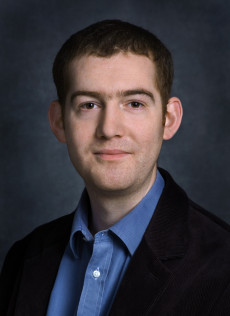Andy Aspden Joins CCSE as Inaugural Seaborg Post-Doc Fellow
December 1, 2006
Armed with a Ph.D in applied mathematics from the University of Cambridge and a thirst to “broaden his horizon,” Andy Aspden has joined Berkeley Lab as part of the inaugural class for the Glenn T. Seaborg Postdoctoral Fellowships.
Aspden will work with John Bell, leader of the Center for Computational Sciences and Engineering in CRD, to expand on his research in fluid dynamics. Aspden, who began his appointment last month, met Bell three and a half years ago when Bell was collaborating with his Ph.D advisor, N. Nikiforakis.
“I was interested in working with John, and this opportunity for the fellowship came up,” said Aspden.
Aspden is one of the two people awarded the 2006 Seaborg fellowships, which enable ”outstanding recent Ph.D. recipients”to carry out research in any Lab division for three years. Aside from receiving a salary, a Seaborg fellow also gets a $20,000 annual research grant.
Aspden, who hadn’t worked or lived abroad before the fellowship appointment, has earned degrees and conducted research at prestigious universities. Aside from Cambridge, Aspden attended the University of Oxford for four years and graduated with a master’s degree in mathematics in 2002. Oxford awards the degree to students who combine their undergraduate and master’s work in four years.
The Briton’s talent for math emerged early in life. Aspden won local and national awards for mathematics while he was at Rainford High School in St. Helens, United Kingdom. At Oxford, he scored well on an exam and won a scholarship that helped to pay for his remaining three years at the university.
His doctoral work, titled “Monotone Integrated Large Eddy Simulation of Buoyant Turbulent Jets,” examined the behaviors of different types of turbulent flows. Studying turbulent flow is to look at the rapid property changes of liquid and gases in motion by using mathematical models and computer simulations.
As a fellow, Aspden plans to build on his previous study and work closely with Bell, who is well-known for his research in computational fluid dynamics, particularly in the area of turbulent combustion.
Outside of work, Aspden enjoys playing soccer, pool and piano. His wife, Julie, is a post-doc at UC Berkeley’s Department of Molecular and Cell Biology.
About Berkeley Lab
Founded in 1931 on the belief that the biggest scientific challenges are best addressed by teams, Lawrence Berkeley National Laboratory and its scientists have been recognized with 16 Nobel Prizes. Today, Berkeley Lab researchers develop sustainable energy and environmental solutions, create useful new materials, advance the frontiers of computing, and probe the mysteries of life, matter, and the universe. Scientists from around the world rely on the Lab’s facilities for their own discovery science. Berkeley Lab is a multiprogram national laboratory, managed by the University of California for the U.S. Department of Energy’s Office of Science.
DOE’s Office of Science is the single largest supporter of basic research in the physical sciences in the United States, and is working to address some of the most pressing challenges of our time. For more information, please visit energy.gov/science.










